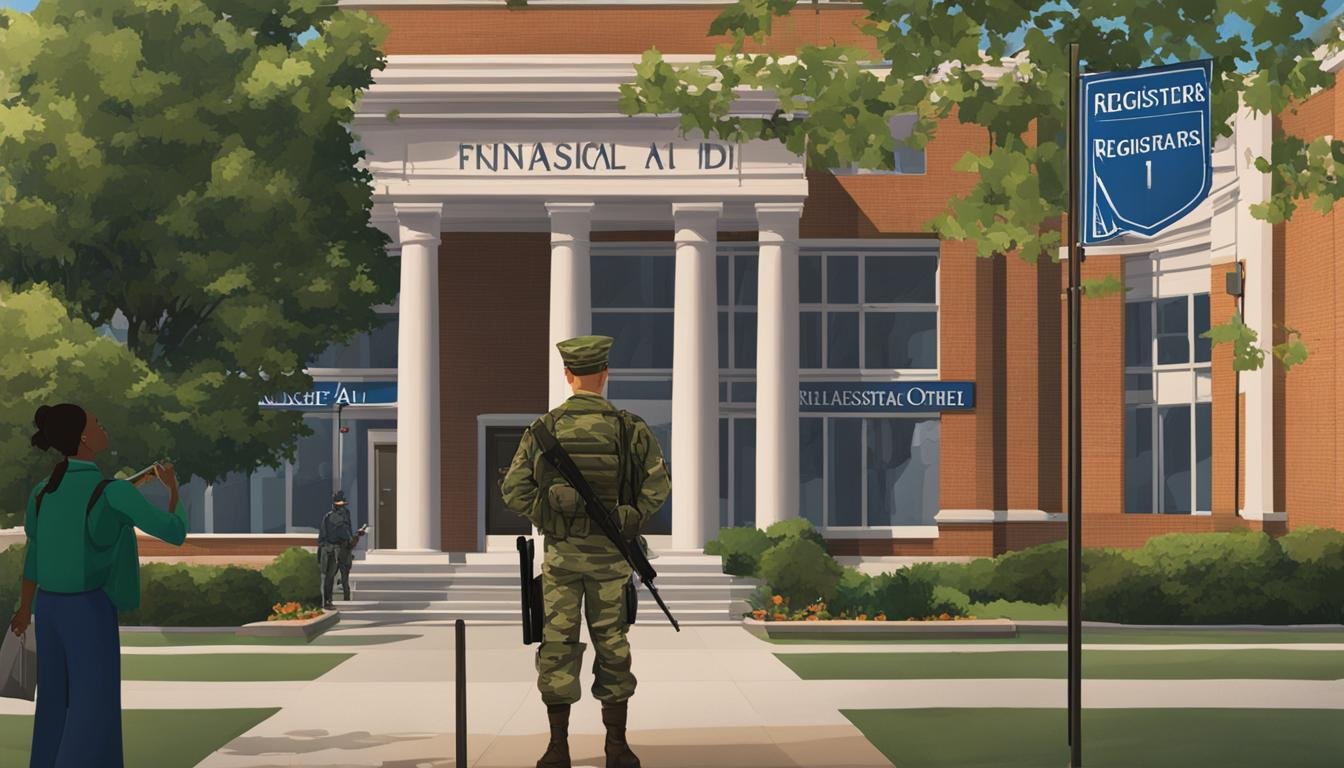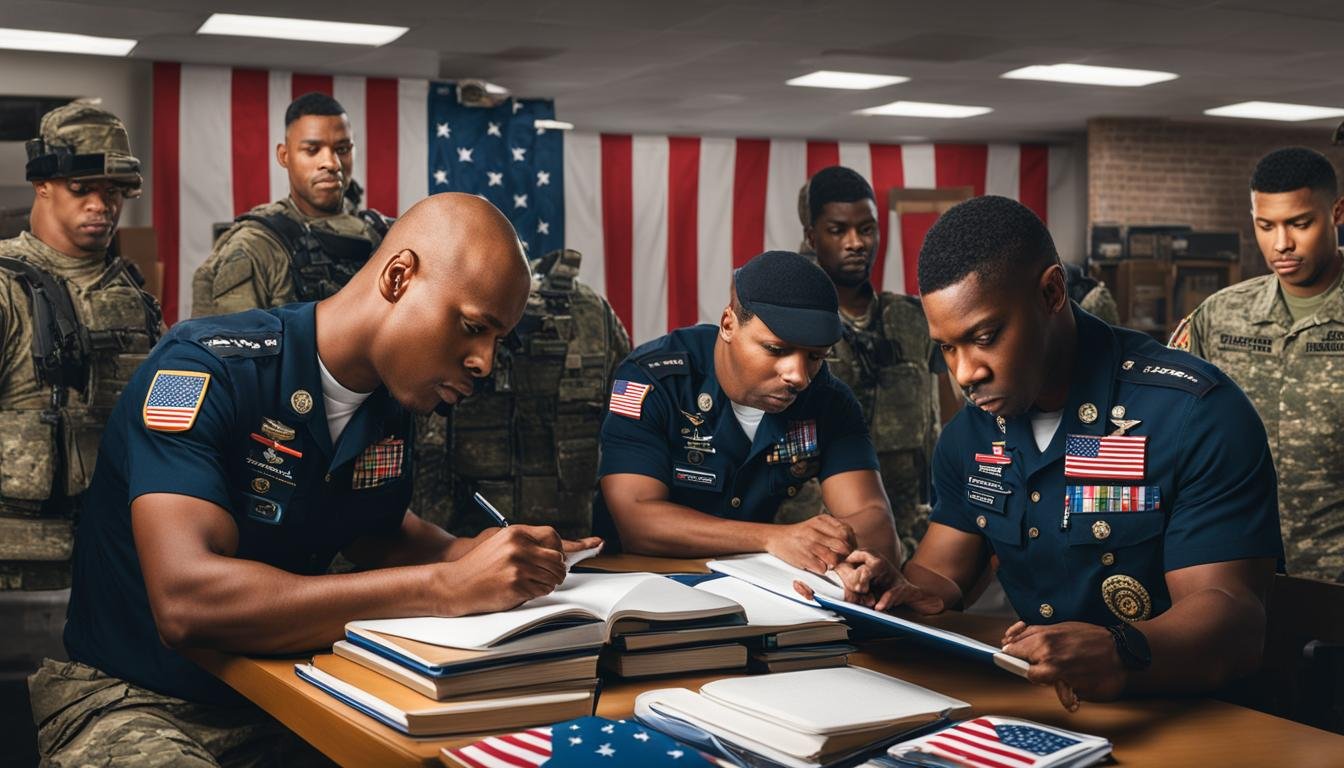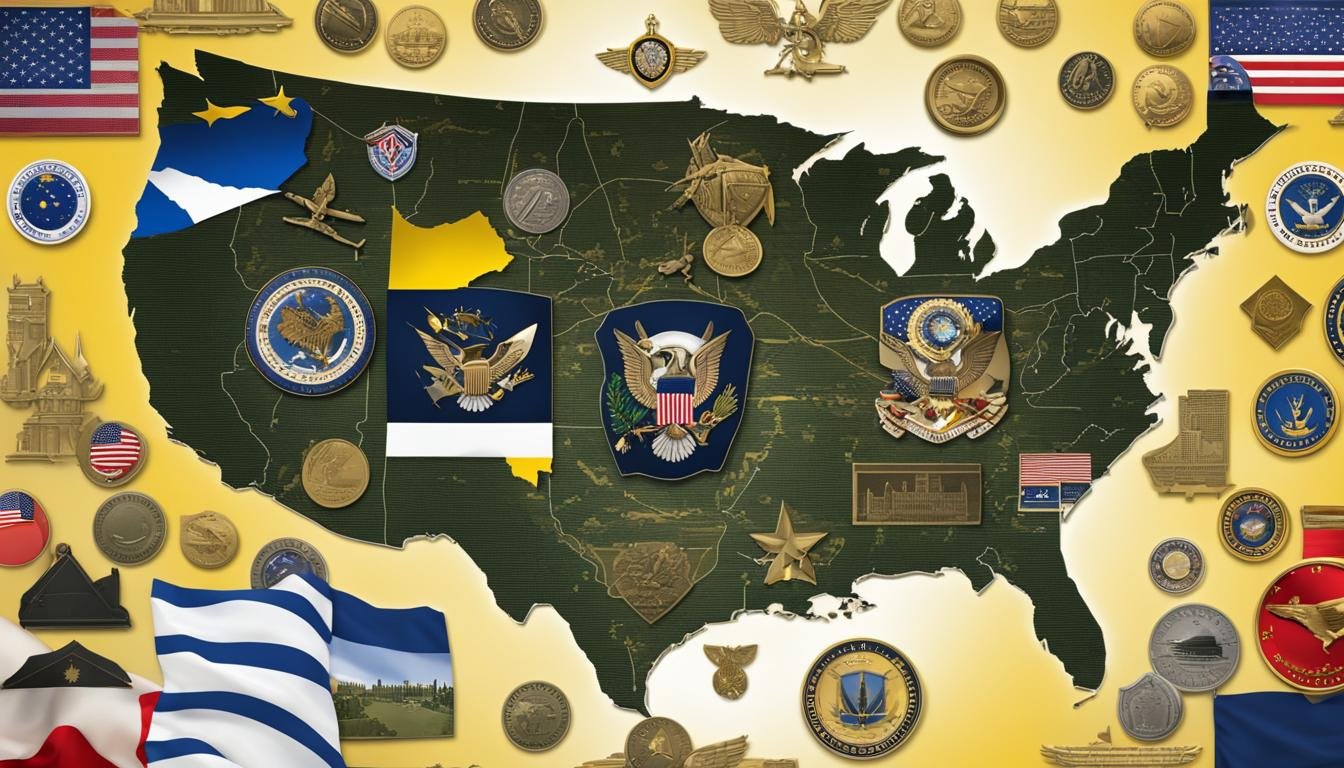Veterans face unique challenges when navigating the college application process. However, this has not deterred nearly 900,000 veterans from pursuing higher education using their Post-9/11 GI Bill benefits and Yellow Ribbon Program funding. To ensure a seamless application process, veterans should focus on organizing their application materials, applying for benefits early, arranging for transfer credits, brushing up on their skills, and seeking out resources.
Key Takeaways:
- The college application process presents unique challenges for veterans.
- Organize your application materials, including transcripts, recommendation letters, and a compelling personal statement.
- Apply early for benefits like the Post-9/11 GI Bill and explore additional financial aid options.
- Consult with admissions staff to arrange for transfer credits.
- Brush up on your skills by enrolling in college-level courses or utilizing veteran-focused programs.
- Seek out resources such as veterans’ resource centers and networking opportunities.
- By leveraging your military experience and utilizing support, you can navigate the application process successfully.
Organize Your Application Materials
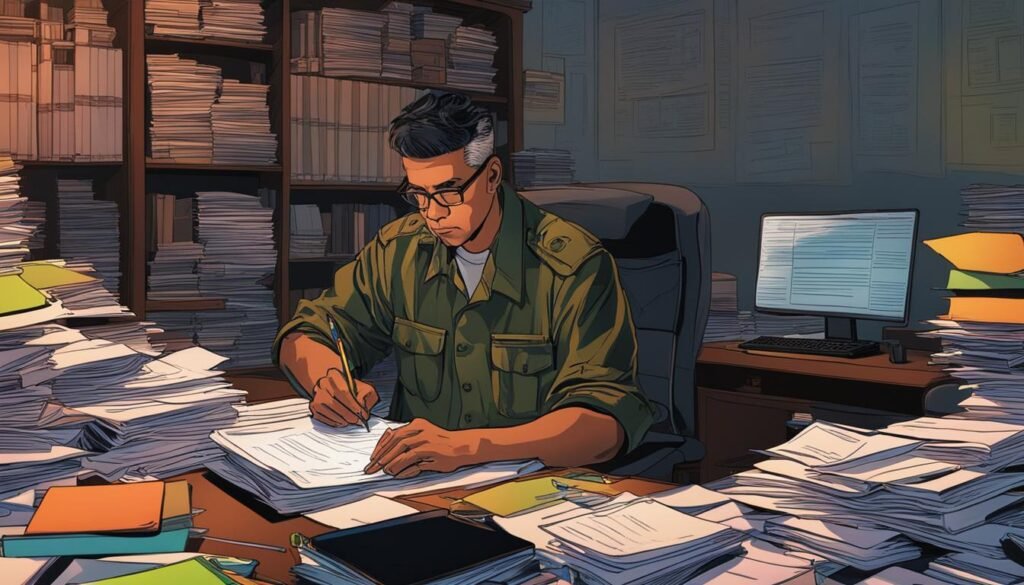
When it comes to applying for college as a veteran, organization is key. By gathering all your necessary application materials in advance, you can streamline the process and ensure that you meet all the required deadlines.
Start by collecting letters of recommendation, transcripts from your military training and any previous college courses, standardized test scores (if required), and your application essay. Your personal statement is particularly important, as it provides an opportunity for you to showcase your unique experiences and contributions as a veteran. Craft a compelling narrative that highlights your strengths and the value you can bring to the college community. Be sure to emphasize how your military service has shaped your perspective and made you a stronger candidate.
Admissions staff value diversity of thought, experience, and background when considering applicants. By organizing your application materials and crafting a compelling personal statement, you can present yourself in the best possible light and stand out from the competition.
Table: College Application Deadlines and Timelines
| Task | Deadline |
|---|---|
| Request official transcripts | Three months before application deadlines |
| Obtain letters of recommendation | Two to three months before application deadlines |
| Complete standardized tests (if required) | One to two months before application deadlines |
| Craft and polish your personal statement | One month before application deadlines |
| Submit your applications | At least two weeks before application deadlines |
By following this timeline and staying organized, you can ensure that you submit all your application materials on time and give yourself the best chance of being admitted to your desired college.
Remember, the college application process can be competitive, but as a veteran, you have unique experiences and perspectives that can make you a standout applicant. Take the time to organize your materials, craft a compelling personal statement, and meet all the required deadlines. With careful planning and preparation, you can increase your chances of success and embark on an exciting new chapter of your life.
Veteran Resources for College Application Preparation
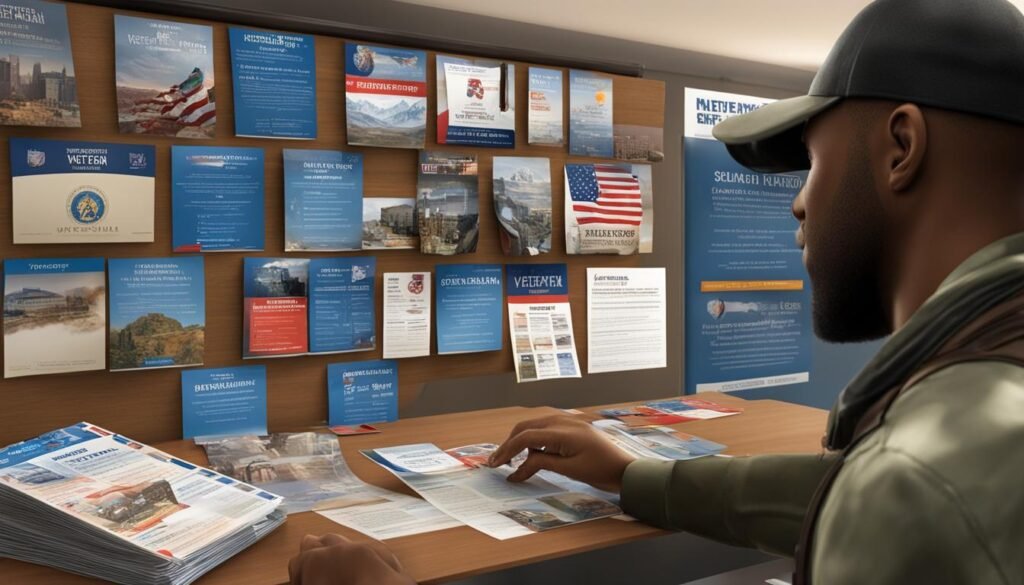
When it comes to preparing for the college application process, veterans have access to a wide range of resources specifically designed to meet their unique needs. These resources can provide guidance, support, and valuable information to help veterans navigate the application process successfully.
College Application Fee Waivers
One valuable resource for veterans is the availability of college application fee waivers. Many colleges and universities offer application fee waivers specifically for veterans, allowing them to submit their applications without incurring any costs. This can be a significant financial relief, particularly for those veterans who may be applying to multiple institutions.
Veteran-Friendly Support Services
In addition to fee waivers, veterans can also benefit from the support services provided by colleges and universities. Most institutions have dedicated veteran resource centers, staffed by knowledgeable professionals who understand the unique challenges that veterans may face during the application process. These centers can provide individualized advice and assistance, ensuring that veterans have access to the information they need to make informed decisions.
Financial Aid and Scholarships
Financial aid and scholarship opportunities are also important resources for veterans. In addition to the Post-9/11 GI Bill benefits, veterans may be eligible for additional financial aid and scholarships specifically designed for them. Exploring these options can help veterans maximize their funding and reduce their out-of-pocket costs.
Transition Programs and Workshops
Many colleges and universities offer transition programs and workshops specifically for veterans. These programs provide support and guidance throughout the college application process, helping veterans understand the unique aspects of the application, identify transferable skills from their military experience, and develop strategies for success in higher education.
By taking advantage of these resources, veterans can ensure that they are well-prepared for the college application process. From fee waivers to individualized support services, there are numerous opportunities available to help veterans navigate the application process with confidence.
Arrange for Transfer Credit
When applying to college as a veteran, arranging for transfer credit can be a valuable strategy to streamline your academic journey. Transferring credits from previous college courses and military training can help you bypass certain general education requirements, saving you time and money as you work towards your degree.
Table: Transfer Credit Policies
| College | Transfer Credit Policy |
|---|---|
| XYZ University | Accepts transfer credits from military training and accredited institutions. Offers evaluation services to determine credit eligibility. |
| ABC College | Requires official transcripts for transfer credit evaluation. Offers credit for military training based on ACE recommendations. |
| DEF University | Has a maximum transfer credit limit of 60 credits. Accepts military training for elective credits only. |
It is important to note that each college has its own transfer credit policies, so it’s crucial to consult with admissions staff to understand the specific requirements and procedures. Some colleges may require official transcripts, while others may rely on ACE recommendations for credit evaluation. By understanding the transfer credit policies, you can better plan your course selection and potentially graduate early.
Highlighting your military service in college applications is another essential aspect of the transfer credit process. Admissions staff value the unique skills and experiences that veterans bring to the campus community. Make sure to clearly communicate your military background in your application materials, such as your personal statement and letters of recommendation.
Veteran-Friendly College Application Strategies
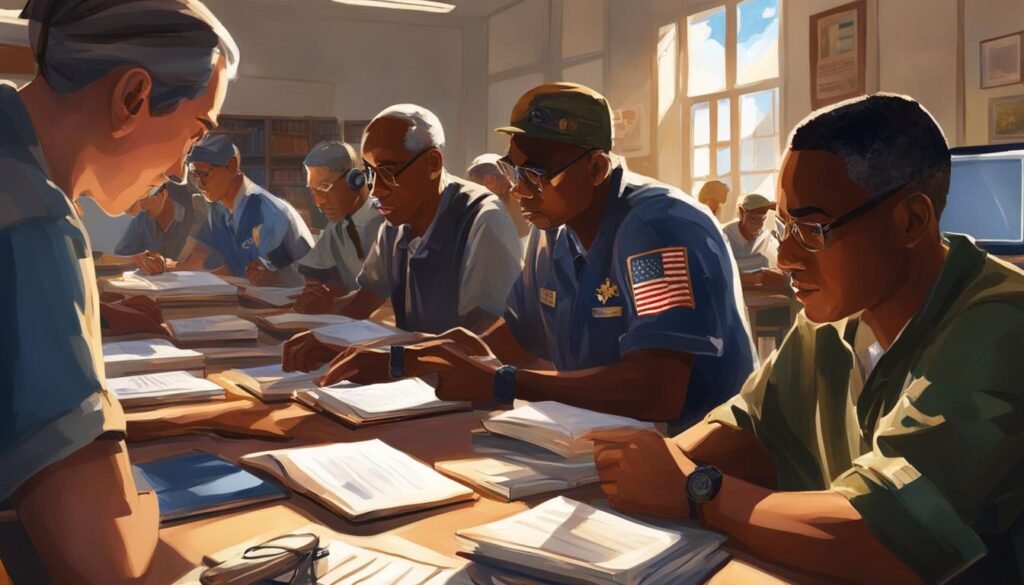
As a veteran navigating the college application process, there are several strategies you can employ to simplify and streamline the experience. By implementing these veteran-friendly approaches, you can optimize your chances of success and ensure a smooth transition into higher education.
Gaining a Competitive Edge
One important aspect of the college application process is demonstrating your readiness for academic success. As a veteran, it may have been some time since you last took college-level courses. To showcase your capabilities, consider enrolling in classes at a community college. This not only allows you to brush up on your academic skills but also provides a recent record of your academic achievements. Nonprofit programs such as Veterans Upward Bound and the Warrior-Scholar Project are invaluable resources for veterans looking to enhance their skills before entering college.
Utilizing Veteran-Specific Resources
There are numerous resources available specifically designed to support veterans during the college application process. Veterans’ resource centers at colleges provide tailored guidance and advice to veterans, helping them navigate the unique challenges they may face. Additionally, connecting with fellow veterans and servicemembers through student organizations, LinkedIn, and organizations like Service to School can offer valuable insights and tips based on personal experiences. The Dolce Center for the Advancement of Veterans and Servicemembers at Northeastern University is an excellent example of a comprehensive support center for veterans throughout the college application and transition process.
Maximizing Financial Support
Financing your education is a crucial aspect of the college application process. As a veteran, you may be eligible for various financial aid options, including GI Bill benefits, scholarships, grants, and federal funding. It’s important to research and understand these benefits and apply for them early, as the application process can take several months. Taking advantage of resources like the Yellow Ribbon Program and seeking guidance from college financial aid counselors can help you maximize your financial support and alleviate potential financial burdens.
| Benefit | Description |
|---|---|
| GI Bill Benefits | A comprehensive package of education benefits for veterans, offering assistance with tuition, housing, and other educational expenses. |
| Scholarships | Merit-based or need-based financial awards that do not need to be repaid. Many scholarships specifically target veterans. |
| Grants | Financial aid awarded based on financial need, often provided by the federal government, state government, or educational institutions. |
| Federal Funding | Various federal programs, such as the Pell Grant, provide financial assistance to eligible students, including veterans. |
By implementing these veteran-friendly college application strategies, you can simplify the application process and increase your chances of gaining admission to the college of your choice. Remember to leverage your unique experiences and seek support from veteran-specific resources to maximize your success.
Veteran Resources for College Application Preparation

Veterans have access to a wide range of resources to help them navigate the college application process successfully. These resources provide specific guidance and support tailored to veterans’ unique needs, ensuring a smooth transition into higher education. By utilizing these veteran-friendly college application strategies, veterans can maximize their chances of admission and gain valuable insights to create compelling applications.
One valuable resource for veterans is the Veterans’ Resource Centers available at many colleges and universities. These centers offer comprehensive support and guidance, addressing the specific challenges and concerns veterans may face during the application process. They provide assistance with organizing application materials, crafting personal statements, and understanding the benefits and financial aid available to veterans.
Additionally, connecting with fellow veterans and servicemembers through student organizations, professional networking platforms like LinkedIn, and organizations such as Service to School can be highly beneficial. These connections allow veterans to gain valuable advice, share experiences, and learn from those who have successfully navigated the college application process. By tapping into the collective knowledge and expertise of the veteran community, veterans can gain valuable insights and tips to enhance their applications.
“The Veterans’ Resource Centers and connections with fellow veterans provide a support network that understands the unique challenges veterans face during the college application process.”
One exceptional example of a comprehensive support center for veterans is the Dolce Center for the Advancement of Veterans and Servicemembers at Northeastern University. This center offers a wide range of resources, including academic advising, career services, and support for transitioning veterans. Through programs and services tailored to veterans’ needs, the Dolce Center provides a holistic approach to support veterans throughout the college application and transition process.
By taking advantage of these veteran resources for college application preparation and leveraging their military experience, veterans can create compelling applications that highlight their distinct perspectives and strengths. With the right guidance and support, veterans can successfully navigate the college application process and embark on a rewarding educational journey.
Conclusion
The college application process for veterans may present unique challenges, but with proper organization, early benefit application, credit transfer arrangements, skills enhancement, and resource utilization, you can navigate it successfully. By leveraging your military experience and seeking support from various resources, you can create compelling applications that highlight your distinct perspectives and strengths.
It is essential to understand the timelines involved in the college application process for veterans. Start organizing your application materials early, ensuring you have all the necessary documents and crafting a compelling personal statement that showcases your experiences and contributions. Applying for benefits early is crucial, as the process can take several months. Research and understand your GI Bill benefits, explore additional funding options, and take advantage of college financial aid counselors and private scholarships.
Arranging for transfer credits can help you bypass certain requirements and accelerate your graduation. Consult with admissions staff to understand each college’s transfer credit policies. Additionally, consider brushing up on your skills by enrolling in college-level courses or utilizing resources like Veterans Upward Bound and the Warrior-Scholar Project.
Lastly, seek out the various resources available to you throughout the application process. Connect with veterans’ resource centers at colleges, join student organizations, and tap into online platforms like LinkedIn and organizations like Service to School. These resources can provide guidance and support tailored to your needs. Remember, the Dolce Center for the Advancement of Veterans and Servicemembers at Northeastern University is just one example of a comprehensive support center you can utilize.
FAQ
What application materials should veterans gather for the college application process?
Veterans should gather letters of recommendation, transcripts from military training and previous college courses, standardized test scores (if required), and an application essay.
How important is the personal statement in the college application process for veterans?
The personal statement is crucial in highlighting a veteran’s unique experiences and contributions, and admissions staff value diversity of thought, experience, and background when considering applicants.
Why is it important for veterans to research and understand their GI Bill benefits?
Understanding GI Bill benefits is crucial for veterans as it is their primary source of funding for higher education. It is also important to explore other funding options such as scholarships, grants, and federal funding.
When should veterans apply for benefits?
Veterans should apply for benefits early, as the process can take up to six months.
Can veterans transfer credits from previous college courses and military training?
Yes, veterans can potentially transfer credits to their new institution, which can help bypass certain general education requirements and even enable them to graduate early. Each college has different policies regarding transfer credits, so it is crucial to consult with admissions staff for a smooth credit transfer process.
Should veterans consider enrolling in courses at a community college?
If veterans have not taken many college classes recently, it is advisable to enroll in courses at a community college to demonstrate a history of success at the college level.
What resources are available for veterans during the college application process?
Veterans should utilize resources such as veterans’ resource centers at colleges, connecting with fellow veterans and servicemembers, and seeking guidance from organizations like Service to School and the Dolce Center for the Advancement of Veterans and Servicemembers at Northeastern University.
By organizing application materials, applying for benefits early, arranging for credit transfers, brushing up on skills, and seeking out resources, veterans can navigate the college application process successfully. It is important for veterans to leverage their military experience and reach out for guidance and support whenever needed to ensure a smooth transition into higher education.

